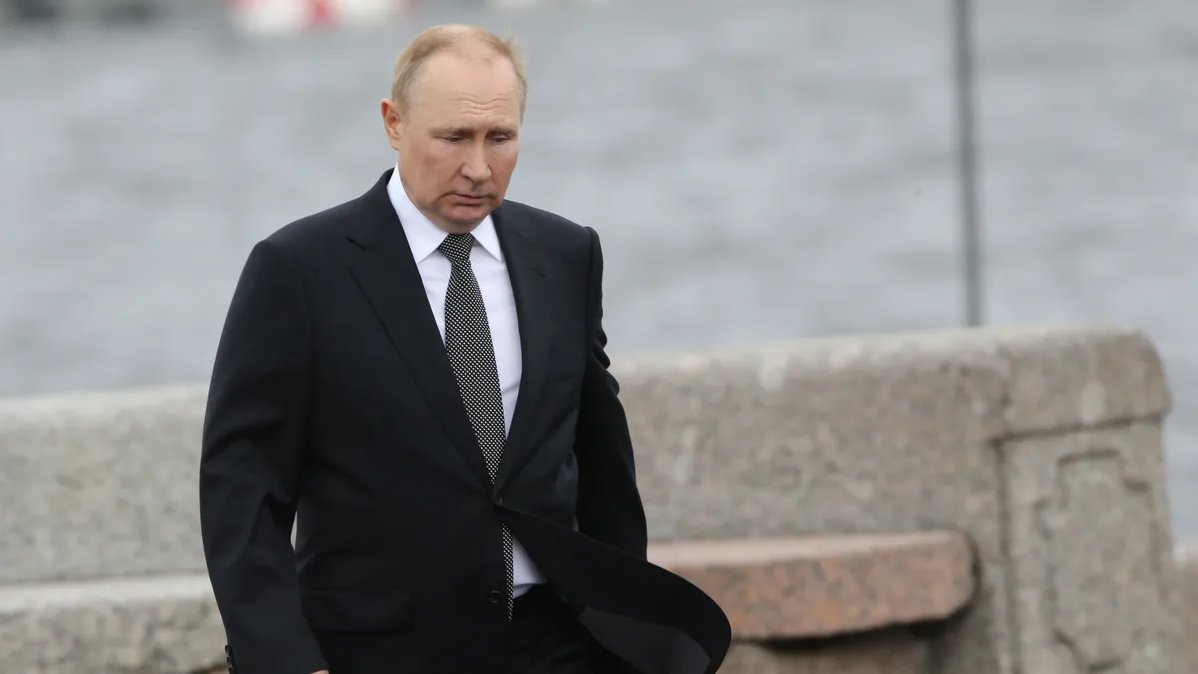Several days ago, one of the closest associates of Vladimir Putin, Viktor Cherkesov, was laid to rest in St. Petersburg.
No high-level officials attended the funeral. Despite the fact that Cherkesov was one of the people who helped pave Putin’s way from a St. Petersburg administration department chief to the person sitting in the most coveted Kremlin chair.
Instead, during the funeral, journalists saw St. Petersburg governor Alexander Beglov lay flowers on the grave of the son of another of Putin’s ex-associates — who was also ousted some time ago.
Novaya-Europe explains what happens to members of the president’s “old guard”once they have fallen from grace.
Cherkesov and Putin over the years
Viktor Cherkesov was buried at Novodevichy Cemetery in St. Petersburg. It is a closed-type necropolis, with burial spots not being available to many.
The only high-ranking official to attend the funeral was Sergey Stepashin, who briefly served as Russian Prime Minister in 1999 under President Boris Yeltsin. A couple of St. Petersburg politicians, including governor Beglov, were also in attendance.
All the other top-level Moscow officials who started their political careers in St. Petersburg made do with telegrammes and wreaths. The biggest wreath was sent by Vladimir Putin.
Putin and Cherkesov have known each other since the 1970s, back when they both worked in the investigation service of Leningrad and the Leningrad region (present-day St. Petersburg). But they served in different departments: Putin worked in counterintelligence, while Cherkesov focused on tracking dissidents.
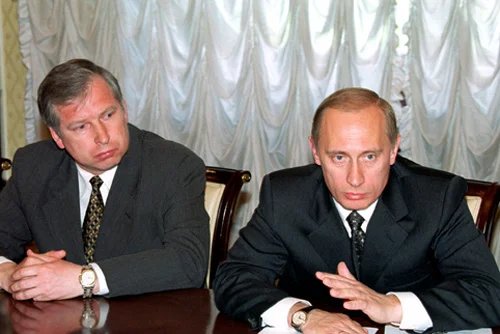
Viktor Cherkesov and Vladimir Putin, 2000. Photo: Wikimedia Commons, Kremlin.ru
By the time of Putin’s return from a business trip to the German Democratic Republic in 1990, Cherkesov had made it big and entered the higher-level ranks of the Leningrad KGB. It was with his help that Vladimir Putin was appointed head of the Committee for External Relations of the St. Petersburg Mayor’s Office in July 1991.
Back then, Soviet laws were still enforced, and it was impossible to be appointed to such posts without KGB’s approval. In 1992, Cherkesov became chief of the St. Petersburg Security Forces Directorate (part of a structure which would later become the FSB); throughout the following years, he continued supporting Putin.
It bears saying that Putin did not forget about Cherkesov’s help. After his rapid career rise, when Boris Yeltsin’s son-in-law Valentin Yumashev and oligarch Boris Berezovsky had made him into director of the Federal Security Service (FSB) in 1998,
Putin appointed Cherkesov his first deputy.
After Putin was elected president in 2000, he appointed Cherkesov as his plenipotentiary envoy to the Northwestern Federal District of Russia.
Three years later, he became head of the Federal Drug Control Service (FSKN) created by Putin. The new agency instantly began to claim one of the leading positions in Russia’s power unit, a fact which was not appreciated by Cherkesov’s ex-colleagues from FSB.
“Back then, the infighting played into the hands of Putin,” an-ex general from FSKN, who wishes to remain anonymous, tells Novaya-Europe. “He hadn’t yet had the absolute power he has today, so he acted according to the old postulate ‘divide and conquer’. Refusing to back any of the warring sides, he made no moves to resolve the conflict: so that no power structure ended up wielding too much authority.”
Everything changed in October 2007, when Viktor Cherkesov published an article in Russian newspaper Kommersant. In the article, he called upon security officials to give up personal enrichment and claim responsibility for their country.
Not only Putin but also his entire inner circle deeply disliked the article. According to El Pais, Putin demanded Cherkesov publish “clarifications”, in which he had to claim that he had not been understood correctly.
Cherkesov refused to do so, and in May 2008, he was demoted to head the Federal Agency for the Procurement of Military Equipment, and two years later, he was fired from all of his posts. Back then, Russian Newsweek noted that it was the first time a close associate of Putin’s had been dismissed entirely.
St. Petersburg governor Beglov, whose career was also helped by Cherkesov, stayed until the end of the funeral proceedings.
After Cherkesov’s grave was covered with flowers, Beglov went to his car, took out another bouquet, and made a trip along a side alley. Photo correspondent for Fontanka followed Beglov and took pictures of him laying the flowers on one of the fresher graves.
Coming closer, the journalist saw that it was the grave of Dmitry Goloshchapov. Dmitry was the son of one of the most mysterious people in Putin’s inner circle.
Support independent journalism
All independent media have been banned in Russia which makes our work not only challenging but outright dangerous. We need your support.
Konstantin Goloshchapov: the Putin’s masseur
Konstantin Goloshchapov is known as “Putin’s masseur” and “Padre”. The public is barely aware of his existence. Goloshchapov has never enjoyed attention — he did not advertise being able to influence the president, thoroughly covering up his purchases and assets.
Perhaps this is why Goloshchapov is the only close associate of Putin’s who did not end up on the sanction lists and whose international assets were not seized.
But a narrow circle of people were aware that with just one phone call, Goloshchapov could ensure that someone got appointed to the executive power higher-level jobs, received a billion-ruble contract or a large loan, or was awarded a top-level state decoration.
There are no credible reports on how Putin and Goloshchapov met. There are several versions mentioned in countless articles dedicated to the “Putin’s masseur”. One of them indicates that they both did judo and met during a competition back in their school days.
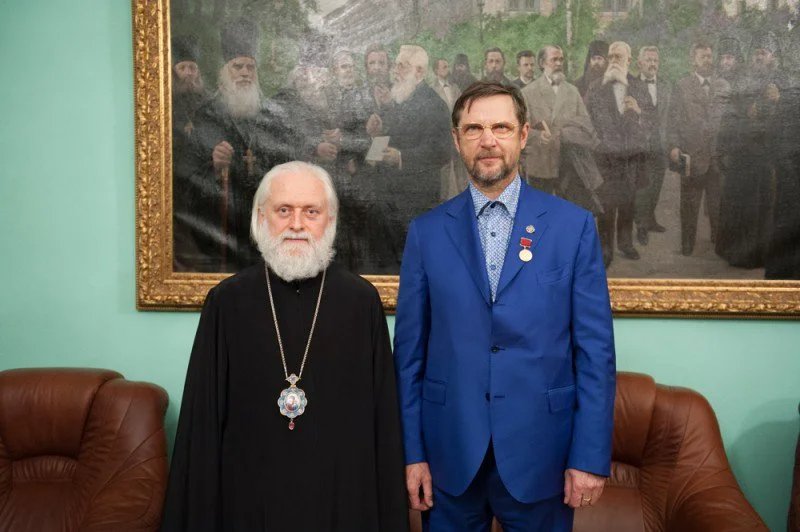
Konstantin Goloshchapov (on the right). Photo: Twitter
According to another version, Goloshchapov, whose specialisation is massage therapy, used his skills on Putin after the future president had hurt his back during his KGB days.
There are other, weirder versions, but only two details are constantly mentioned in all of them: judo classes and massage.
Novaya-Europe is of the opinion that Putin and Goloshchapov were introduced by Arkady Rotenberg, a Russian billionaire and Putin’s close associate, who earned his fortune through state-sponsored oil pipelines. Rotenberg was also mentioned in the Pandora Papers. Goloshchapov frequented Rotenberg’s sports club in the late 1970s.
No titles, no jobs, no business
In 2001, Goloshchapov and Rotenberg founded the SMP bank, which as of now, is one of the top-20 Russian banks by assets. Goloshchapov did not remain the bank’s co-founder for long, assigning his shares to Boris Rotenberg, Arkady Rotenberg’s brother. How much the deal was worth remains unknown.
The first time Goloshchapov was mentioned by the media was in 1996, just after Putin was appointed deputy chief of the Presidential Property Management Department.
A couple of months later, Konstantin Goloshchapov became head of Roscentrproekt, an organisation with an unclear purpose.
According to air travel database Sirena, Goloshchapov flew from Moscow to St. Petersburg and back about 400 times during the existence of this organisation (it was liquidated in 2005).
A lot of different people were seated near the “masseur” during those flights, mostly the ones from St. Petersburg to Moscow, and many of them went on to take up positions in state bodies and state corporations or become successful businessmen.
Later on, the media interested in Goloshchapov speculated that “Padre” took the people who could pay him from 50 to 200 thousand dollars to Moscow and ensured they would be given cushy jobs.
Despite the fact that Roscentrproekt was officially liquidated in 2005, Goloshchapov was referred to as director of the organisation in a presidential decree signed by Dmitry Medvedev, which awarded Konstantin Goloshchapov and his wife Iraya Gilmutdinova with the Order of Parental Glory (the couple has six kids). It seems that “Putin’s masseur” has no other titles.
As it often happens, if nothing is known about a person close to the authorities, then a lot of hypotheses, contradictory theories, and gossip appear in the media. This is what happened with Goloshchapov.
For example, Italian media name him as the owner of football club Bari and two 4-star hotels in the centre of Rome and Cagliari.
It is true that Goloshchapov visited the city of Bari, where the Relics of Saint Nicholas are kept. It is also true that there are pictures of “Padre” with the head coach of the football club. However, according to the official information, the owner of the club is an Italian film producer Aurelio De Laurentiis, who also owns the Napoli football club.
Goloshchapov’s son, Dmitry, was listed as the owner of the Cagliari hotel until this year. Furthermore, the hotel has been closed for restoration for several years now, but no repairs are being done. The restoration stopped at the same time as the sanctions against the Rotenberg brothers were introduced. This could mean that Dmitry simply acted as a figurehead.
In truth, it is more the habit of government officials to register businesses and real estate in the name of their relatives. And although Goloshchapov does not have any official posts, his main business and properties (in 2017, newspaper Delovoy Peterburg estimated them at 18.2 bln rubles, or €291 mln) are registered in his wife’s name.
According to Delovoy Peterburg, Goloshchapov’s wife, Iraya, is owner and co-owner of over 30 companies, as well as dozens of real estate properties. Both in Russia and in Italy, Greece, Germany, Croatia, Montenegro.
It is quite possible that Iraya Gilmutdinova is, in fact, a very talented businesswoman, who had the time to build a business empire in between raising six children.
Her husband, of course, helped, but according to the few comments made by friends and partners of the Goloshchapov family, he spent most of his time on church business.
The Mount Athos club
Konstantin Goloshchapov’s nickname being “Padre” is not accidental. He is, in fact, a very religious person, who spends a lot of his time on church-related activities.
Still, he has an original way of doing things. For example, in 2014, the Temple Foundation, the executive director of which is Goloshchapov, was raising money for the needs of the Saint Panteleimon Monastery located on Mount Athos. The main “donors” were utility and road services of St. Petersburg. All the companies engaged in that sector were assigned a fixed rate: they had to transfer from 20% to 30% of their working capital to the Temple Foundation. When this fact had become known, the public were waiting for a scandal to erupt. But that did not happen. The media were ordered to keep quiet, and the scandal went away.
The church-related activities of “Putin’s masseur” began in 1999 — when the companies controlled by the Goloshchapov family were allocated 10 hectares of land in the Vyborgsky district of the St. Petersburg region.
A temple was built on the territory; it was consecrated by Patriarch Alexy II in 2001. A number of high-ranking officials were present at the consecration, including Viktor Cherkesov, who served as the president’s plenipotentiary envoy to the Northwestern Federal District of Russia at the time.
One of the main benefactors of the temple is Vladimir Barsukov, the leader of the Tambov Gang, who donated several ancient icons to the temple.
Another benefactor is said to be Vladimir Putin, who in turn gifted an ancient icon of Saint Nicholas.
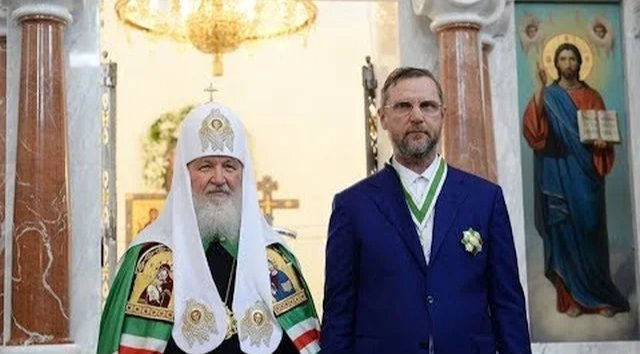
Konstantin Goloshchapov. Photo: Twitter
“Goloshchapov and Barsukov have known each other since the end of the 1990s,” one of the members of the Tambov Gang, Alexander (full name at the disposal of Novaya-Europe) says. “Moreover, many government officials, including the Moscow-based ones, wanted to befriend Barsukov at that point, but in this case, everything was the other way around.
“As far as I know, he spent about $100m on various projects of Goloshchapov’s. But Goloshchapov didn’t leave his debts unpaid. Although he didn’t advertise his friendship with Barsukov, he didn’t hesitate to show up at Baruskov’s 50th anniversary celebration. People who know how the world works saw a lot of meaning in that gesture.”
Currently, there is a whole temple complex built: three temples and a women’s monastery. Patriarch Kirill visits the place a lot to hold services.
In 2005, Vladimir Putin visited the holy Mount Athos. The visit was organised by Metropolitan Kirill, the future patriarch. After the visit, the so-called Russian Athos Community was founded. The list of its co-founders (there are 12 of them!) includes: Sergei Shoigu, Russia’s current Defence Minister, Yury Chaika, Prosecutor General at the time, Yury Luzhkov, who served as Mayor of Moscow at the time, Patriarch Alexy II, Vladimir Yakunin, back then President of state-owned company Russian Railways, and politician Viktor Zubkov.
The constituent documents of the community state that its goals are the development of relations between the Mount Athos monks and the Russian Orthodox Church, restoration of temples on Mount Athos and in Russia, organisation of pilgrim tours.
In reality, it is something of a private club for those who wield power, in which fates of not only Russia but many other countries and peoples are decided. Only seasoned with a certain Orthodox flavour.
Goloshchapov’s fall from grace
Everything mentioned above leads one to the conclusion that Konstantin Goloshchapov is, in fact, a very important person in Putin’s inner circle. Was one. So what happened? Because on 22 June 2022, law enforcement agents raided the Goloshchapov family’s flats and houses.
Formally, the raids were conducted on suspicion of embezzlement of budget funds. In 2020, St. Petersburg’s Investigative Committee pressed embezzlement charges due to the Nostrum construction company having allegedly stolen funds during execution of state orders. One of the co-founders of the company is Iraya Gilmutdinova, Goloshchapov’s wife.
According to investigators, Nostrum signed a series of contracts with utility companies Vodokanal and Lenenergo estimated at 4 bln rubles (€64m) during the time period from 2014 to 2018. However, the jobs were executed poorly or not executed at all.
For two years, there were no developments in the case, and people in the know were certain that it would eventually be covered up.
And suddenly, out of the blue: on 22 June 2022, Russia’s Investigative Committee detained the ex-director of Vodokanal, ex-head of the Main Department of State Expertise, and two employees of the Nostrum company.
Furthermore, the Investigative Committee said to have questions for Kamil Magerraov, who is considered one of the closest partners of the Goloshchapov family.
Konstantin Goloshchapov and Iraya Gilmutdinova are not mentioned in connection with the case. However, their son Dmitry was called in for questioning twice.
There were rumours in the Investigative Committee circles that he would be arrested, but on 25 June, Dmitry died unexpectedly. The father was not present at the funeral. In the middle of June 2022, he left Russia, and it seems he is not planning on returning.
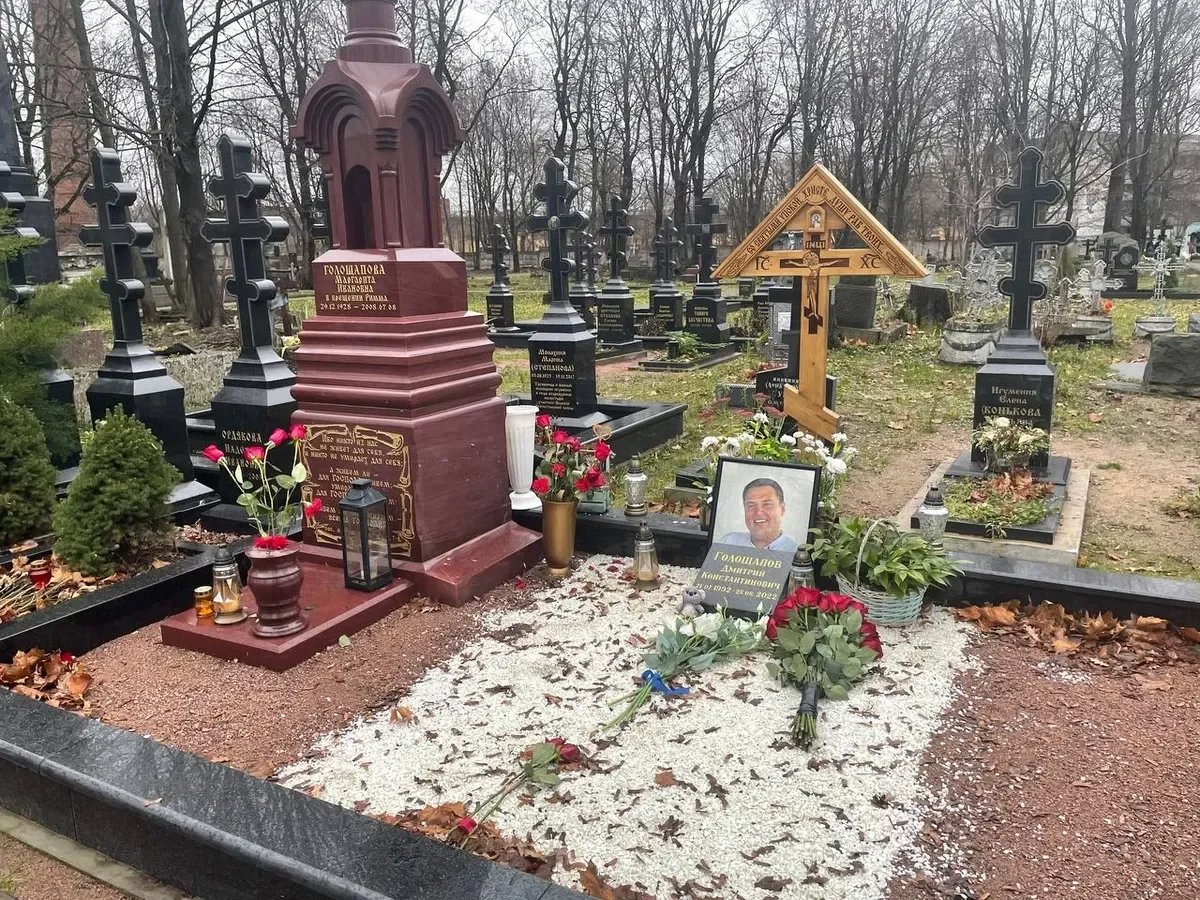
Dmitry Goloshchapov’s grave. Photo: Telegram
“Immediately after his death, there were rumours that he had killed himself,” a representative of St. Petersburg’s elites, who wishes to remain anonymous, shares his thoughts with Novaya-Europe. “But that’s complete nonsense. Just like his father, he was a deeply religious man, and such people would never condemn their souls to eternal suffering which awaits those who kill themselves after death. The theory about a drug overdose is also unsound.
“Most likely, all these searches and interrogations could have had a deathly impact on Dmitry’s health. After all, it’s been known for a long time that heart attacks are ‘getting younger’. Basically, it’s better not to question these things. You will, probably, not be able to uncover the truth, but you could end up with a lot of problems.”
Novaya-Europe was not able to learn credible facts about Goloshchapov’s fall from grace, but we are able to speculate based on vague hints given by our interlocutors. They also were not able to say anything for certain (they warned of this in advance), but due to their knowledge could have some idea of what had been going on.
“Starting from 2014, the Goloshchapov family began to focus more on European countries, business-wise,” one of the sources tells Novaya-Europe. “[Goloshchapov] promptly realised that, as the only person from Putin’s inner circle untouched by the sanctions, he had become a key figure between Russian oligarchs and their foreign assets. This opened up a lot of opportunities.”
“As always, he acted very carefully, thoroughly covering up ‘Russian’ footprints. In particular, he didn’t found tens of firms in Europe with offshore accounts; instead, he acted through third countries — mostly, through ex-Soviet republics. The majority of foreign assets was dependent on Ukrainian firms. And well, after February 2022, everything started hanging by the very thinnest of threads. According to sources, Goloshchapov has lost from 100 to 200 million dollars as a result of the ‘special operation’. Furthermore, this wasn’t just his money.”
According to unverified information, in May 2022, Goloshchapov was at a reception in the Kremlin, where he directly asked Russia’s Defence Minister Sergei Shoigu why Russian troops had not paraded through Kyiv on 9 May as promised.
On the Whit Sunday, one of the principal church holidays, celebrated on 4 June, he allegedly told Patriarch Kirill after a church service that “murder is a deadly sin, and war is nothing but mass murder”.
The fact that Putin did not order to arrest him at once for those words means only that Goloshchapov had been given enough time to pack and leave the country. And only after his departure had the security forces come to his properties with search warrants.
]Vladimir Putin is known to be very sensitive towards criticism addressed towards him. So, it seems unlikely that the “president’s masseur” will ever be given access to the body of the Russian leader again.
Join us in rebuilding Novaya Gazeta Europe
The Russian government has banned independent media. We were forced to leave our country in order to keep doing our job, telling our readers about what is going on Russia, Ukraine and Europe.
We will continue fighting against warfare and dictatorship. We believe that freedom of speech is the most efficient antidote against tyranny. Support us financially to help us fight for peace and freedom.
By clicking the Support button, you agree to the processing of your personal data.
To cancel a regular donation, please write to [email protected]
